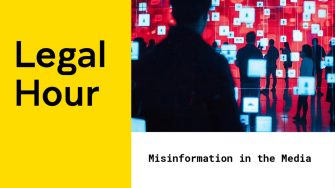Experts highlight urgent need to combat misinformation
Panel discussion focuses on public trust, political democracy, and social cohesion
Panel discussion focuses on public trust, political democracy, and social cohesion

Associate Professor Daniel Joyce led a fascinating Legal Hour panel discussion featuring Scientia Professor Megan Davis, Associate Professor Alyce McGovern, Ben Doherty from The Guardian Australia, and Kevin Lynch from Johnson Winter Slattery.
Their discussion shed light on the shortcomings of Australian media organisations, politicians, legislators, and everyday social media users facing an onslaught of addictive content. Insightful details indicate a society unaware and unprepared for strategic and influential misinformation campaigns. When Australian legislation and democracy aren’t keeping pace with new media technologies, what changes need to happen?
Legal Hour is an event series that showcases expertise from UNSW Law & Justice academics and alumni during a one-hour panel discussion. The October 2024 event at The Sydney Mint explores the influence of media on public opinion, the legal boundaries of free speech, the impact of social media, and misinformation's profound effects on vulnerable groups and democracy.
See the video below for the full discussion or continue reading for a brief overview.
Associate Professor Daniel Joyce, an expert in media law and human rights, opened the discussion, describing misinformation as broadly covering fake news, propaganda, hate speech and selective bias or agendas in media. “This is a historical issue involving the manipulation of public opinion and incitement of violence, and these concerns have intensified in the context of digital platforms and the disruption of our media ecosystem in recent years,’ he said.
Multi-award-winning foreign correspondent Ben Doherty described under-resourced newsrooms with junior journalists working to tight deadlines in competition with social media. He said that striving for balanced and objective reporting can mean ‘ill-informed’ spokespeople are given the same exposure as experts. “It diminishes expert opinion and elevates inexpert opinion as though these things are equivalent,” he said.
“You've done your job as a journalist by presenting both sides of the argument fairly well. You haven't really informed [your audience], by presenting these two things as though they're equal when they're simply not.”
Scientia Professor Megan Davis, a distinguished constitutional lawyer and public law expert, led the Referendum led the Referendum Council work on Constitutional Recognition of Aboriginal and Torres Strait Islander peoples, is the Co-Chair of the Uluru Statement from the Heart's Uluru Dialogue and served on the Voice Referendum Working and Engagement groups and the Attorney General’s Constitutional Expert Group that advised the government.
Agreeing with Mr Doherty, Prof. Davis provided examples of challenges with media fact-checking and balanced reporting throughout the Voice referendum campaign, saying journalists sought her commentary with farcical and offbeat questions.
Prof. Davis outlined the tactical communication strategies that established a divisive narrative that the Yes campaign had not anticipated. She said a manipulated sentiment led Australians to think that most Aboriginal people didn’t want reform and voted accordingly*.
Aboriginal communities had called for legislation protecting the referendum from misinformation, but their insight wasn’t taken seriously until recent election campaigns, Prof. Davis said. She highlighted the tolerance of racist hate speech during debates around the Voice had a huge impact on Aboriginal communities and the associated regulatory systems.
Kevin Lynch, a leading media defamation lawyer, said current Australian legislation is not fit to deal with misinformation campaigns affecting targeted communities. He explained how our strong and costly defamation laws are only a right of action for an individual.
“You can say they’re eating the dogs, they're eating the cats… Haitians in Springfield don’t have a right to sue for defamation, even though each and every one of them has had their reputation traduced by that disinformation,” he said. “There are no class actions in defamation.”
Mr Lynch highlighted that misinformation is an international challenge that calls for co-regulation with industry. There are challenges in enforcing Australian laws on overseas-based companies like Meta and TikTok. Mr Lynch discussed recent measures, such as the eSafety Commissioner holding X liable for harmful content and Instagram’s new teen safety settings, suggesting companies do see the ‘writing on the wall’.
Associate Professor Alyce McGovern, criminology expert and authority on police usage of social media, provided a positive example of combatting misinformation: Queensland Police Service using Twitter (in 2011) to quickly update the public during a large-scale natural disaster.
With the value clearly in cutting through directly to specific audiences, A/Prof. McGovern reflected on the sheer amount of human and financial resources that organisations need to create typical social media content. “We need to be conscious that these are public relations activities,” she says. “There are particular agendas in mind when engaging with these platforms, in these spaces and speaking to particular audiences.”
Ultimately, and until legislation catches up, responsibility remains with the individual to think critically about what they see online, and to question the motives of the people behind the content.
*Post-referendum data shows Aboriginal communities mostly did vote ‘Yes’.